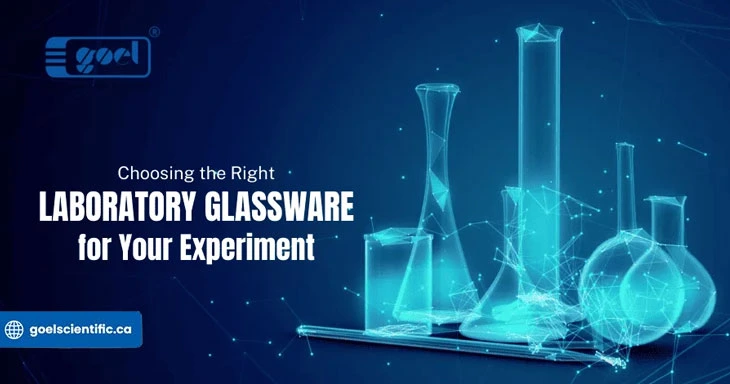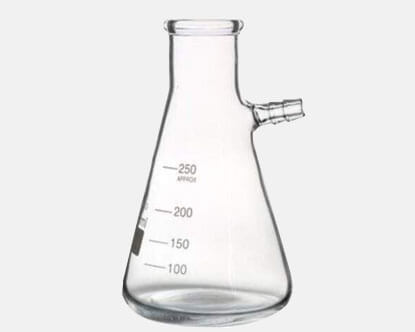
Choosing the Right Laboratory Glassware for Your Experiment By Goel Scientific by USA & CANADA: 1 Ultimate Guide
-

Piyush Shah (Business Director)
-

August 5, 2023
-

Laboratory experiments demand precision and accuracy, and one key element often overlooked is the selection of the right laboratory glassware. In this guide, we, as experts in the field, will provide you with invaluable insights on making the optimal choices for your experiments.
Before delving into the vast array of laboratory glassware options, it’s crucial to understand the specific requirements of your experiment. Consider the type of chemicals involved, the temperature and pressure conditions, and the reaction dynamics. This initial step ensures that the chosen glassware aligns seamlessly with the experiment’s demand
Why Choose Us?
Goel Scientific Glass is a leading global manufacturer and supplier of Laboratory Glassware in bulk. They use premium components such overhead, Borosilicate glass, Glass Heat Exchanger for heat transfer systems with integrated process controls. For process control, we provide specialized Kilo Labs with easily accessible fill-up, collection, and sampling stations
Choosing the Right Laboratory Glassware, for Your Needs
Purchasing Laboratory Glassware helps manage a dynamic portfolio of possible goods while satisfying commercial, quality, safety, and environmental criteria. One must consider different process conditions for corrosion and clean ability. The different conditions include temperature, pressure, data collection and recording, process automation, and material of construction (MoC)
Laboratory glassware used for unit activities such as Beakers are versatile vessels used for mixing, stirring, and heating liquids. Their cylindrical shape and flat bottom make them ideal for a wide range of applications. When selecting a beaker, consider the volume needed and the material compatibility
Flasks come in various shapes, including round-bottom and flat-bottom. Round-bottom flasks are suitable for reactions involving gases, while flat-bottom flasks provide stability during heating. Carefully match the flask type with your experiment’s requirement
The Distinct Types of Laboratory Glassware in The USA & Canada
1. Beakers
Beakers are versatile vessels used for mixing, stirring, and heating liquids. Their cylindrical shape and flat bottom make them ideal for a wide range of applications. When selecting a beaker, consider the volume needed and the material compatibility.
2. Flasks
Flasks come in various shapes, including round-bottom and flat-bottom. Round- bottom flasks are suitable for reactions involving gases, while flat-bottom flasks provide stability during heating. Carefully match the flask type with your experiment’s requirements.
3. Test Tubes
Test tubes are essential for small-scale reactions and observations. With a range of sizes available, they are versatile tools for holding small quantities of substances. Ensure the test tubes chosen are heat-resistant and compatible with the experiment.
4. Filter Flask
Filter flask removing solvent under reduced pressure. Under Vacuum environment, the filtration flask is prone to collapse & thus we are proud to introduce new design of filter flasks .These filter flask are manufactured as per Japanese’s design & are more suitable & strong as compared to existing traditional available designs.
5. Bell Jar
Bell jars are often used in laboratories to form and contain a vacuum. It is a common science apparatus used in experiments. Bell jars have a limited ability to create strong vacuums; vacuum chambers are available when higher performance is needed.
Bell Jar Lanterns are a classic tribute to centuries of lighting. They add a traditional, yet eclectic, feel to any space
We are making a frosted pendant, Sphere up to 18'', Mini ORB, End glass. Half glass & glass cylinder with drilled hole with Frosted (Sandblasted ) length up to 800mm.
6. Erlenmeyer Flasks
Erlenmeyer flask, known as a conical flask, was named after its inventor, German chemist This multi functioning narrow-neck flask is ideal for titrations as the flask can be swirled without spilling and can prevent excessive evaporation. Due to its tapered body and narrow neck, it can support a filter funnel that can separate solids from liquids. In addition, its narrow neck allows the flask to be covered with a glass stopper or cork to enhance shaking and gas exchange during incubation.
7. Storage of laboratory & Media Bottle.
Analytical labs require these bottles for the storage of laboratory reagents. They make for safe storage, handling, and space efficiency. They are easy for laboratory staff to work with and to clean for reuse. They also protect the chemicals from light and contamination
FAQs:
1. Where can I purchase Borosilicate Laboratory glassware ?
Laboratory glassware are available from specialist vendors and manufacturers, such as Goel Scientific. Contact us website using keyword “Laboratory Glassware” near me for renowned high-quality equipment.
Looking for top-grade Laboratory glassware ? Contact us at Goel Scientific Glass for the finest lab Glassware. Our experts will assist you with the best recommendations.
2. What is advantage of Laboratory glassware
The goal of the Laboratory glassware is to provide a simulation that is adaptable and quick for future goods while upholding the standard EHS policy and product quality. It helps with the small-scale manufacture of active medicinal ingredients and assessing production and development procedures before commercialization.
By purchasing Goel Scientific premiere lines of laboratory glassware the user is responsible to operate in the recommended environment safely. We recommend all users to operate in a legal and licensed facility where safety is the number 1 goal. Column packing Raschig rings help save money and time. The aim is to ensure that a product is produced in the cGMP manufacturing process with the same potential and attributes. The glass Raschig Ring lab undergoes several tests and processes before moving to the Distillation pilot plant.
3. Glass Raschig Ring Manufacturers and Suppliers
Goel Scientific Glass is a leading global manufacturer and supplier of Glass Raschig Ring in bulk. They use premium components such overhead, Borosilicate glass, Glass Heat Exchanger for heat transfer systems with integrated process controls. For process control, we provide specialized Kilo Labs with easily accessible fill-up, collection, and sampling stations.
4. Laboratory Glassware In Details
Laboratory glassware is a clean room, that operates in a controlled environment. This type of facility is beneficial because the equipment and experiments are not exposed to any outside contaminant.
5. Choosing the Right Glassware Your Needs
Purchasing a laboratory glassware helps manage a dynamic portfolio of possible goods while satisfying commercial, quality, safety, and environmental criteria. One must consider different process conditions for corrosion and clean ability. The different conditions include temperature, pressure, data collection and recording, process automation, and material of construction (MoC)
Laboratory glassware will be used for unit activities such as Reaction Distillation, isolation, Filtration drying, and systems for charging and discharging. Building systems and process support systems, building utilities (HVAC), electrical systems, potable water, steam and condensate systems, compressed air, fuel oil, natural gas, and process NOX Gas emission control systems are among the utility systems to take into account.
6. What is benefit of Borosilicate Laboratory glassware?
Since the Laboratory glassware is transparent, the process may be observed, recorded, and analyzed in real time. Numerous specialized Distillation systems, Fractional Distillation System such as Coil type Condensers, Vapour Columns, Reflux Divider, Glass Receiver and add-on Vessels, phase separators, valves, and other supporting metal structures, & Glass pipe line & component are available from Goel Scientific.
7. Are Laboratory glass customizable?
Yes. Lab glassware can be customized to meet specific process needs and safety regulations.
8. How to clean Laboratory glassware?
Cleaning Glassware
- 1 Add hot water to Distiller Equipment Cleaner (150-180'F; 1/2 - 1 oz Equipment Cleaner per gallon of Water) then put the rinse Glassware in the mixture
- 2 Soak Glassware in half an hour.
- 3 Thoroughly rinse using Distiller Equipment Rinse or with clean water.












FAQs
1. What types of laboratory glassware are essential for special experiments?
Tspecial laboratory glassware need higher size of Beakers, Flasks, Test tubes, Media Bottle Goel Scientific fabricate borosilicate glassware & supply in bulk starting from 2L to 20L
2. Can the laboratory glassware withstand temperature and pressure conditions? It is autoclaveble?
Yes, it is autoclaveble.our laboratory glassware is designed to withstand extreme temperature and pressure conditions for reliable performance.
3. Are there specific care and maintenance instructions for the laboratory glassware?
Yes, proper cleaning, sterilization, and storage techniques are recommended to prolong the lifespan and performance of the glassware.
